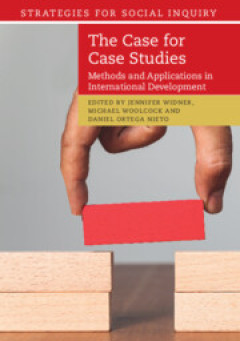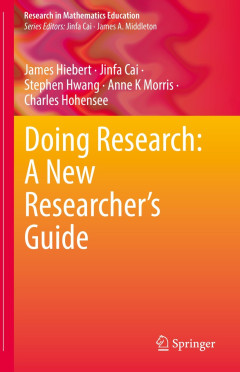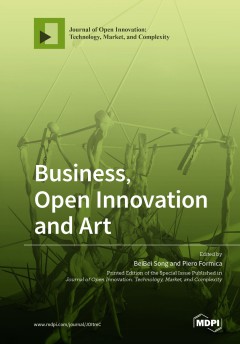Filter by

Dealing with Expectations and Traditions in Research
"When considering societal expectations and traditions in research, assumptions are often an integral aspect – particularly in the disciplines pertaining to organization studies. The objective of this anthology is to analyze, clarify and demystify assumptions about research and the way that organizations work. The book is interdisciplinary in its form and content. The chapters are in part …
- Edition
- -
- ISBN/ISSN
- 9788202400897
- Collation
- ii, 151p.: ill
- Series Title
- -
- Call Number
- 001.42 GAR d

Research methods pedagogy :engaging psychology students in research methods a…
Research methods and statistics are central to the development of professional competence and evidence based psychological practice. Furthermore, the ability to interpret and apply research findings contributes to the development of psychological literacy, the primary outcome of an undergraduate education in psychology. Despite this, many psychology students express little interest in, and in s…
- Edition
- -
- ISBN/ISSN
- 9782889450107
- Collation
- 102p. : ill.
- Series Title
- -
- Call Number
- 150.72 RES r

Pragmatism and methodology:doing research that matters with mixed methods
A pragmatist … turns away from abstraction and insufficiency, from verbal solutions, from bad a priori reasons, from fixed principles, closed systems, and pretended absolutes and origins. He turns towards concreteness and adequacy, towards facts, towards action, and towards power. That means the empiricist temper regnant, and the rationalist temper sincerely given up. It means the open ai…
- Edition
- -
- ISBN/ISSN
- 9781316516140
- Collation
- ix, 236 p ; 24 cm
- Series Title
- -
- Call Number
- 300.72 GIL p

The Case for Case Studies :Methods and Applications in International Development
This book seeks to narrow two gaps: first, between the widespread use of case studies and their frequently 'loose' methodological moorings; and second, between the scholarly community advancing methodological frontiers in case study research and the users of case studies in development policy and practice. It draws on the contributors' collective experience at this nexus, but the underlying iss…
- Edition
- -
- ISBN/ISSN
- 9781108688253
- Collation
- xiii, 330 p
- Series Title
- -
- Call Number
- 300.72 CAS J

The Idea of Progress in Forensic Authorship Analysis
This Element examines progress in research and practice in forensic authorship analysis. It describes the existing research base and asks what makes an authorship analysis more or less reliable. Further to this, the author describes the recent history of forensic science and the scientific revolution brought about by the invention of DNA evidence. They chart the rise of three major changes…
- Edition
- -
- ISBN/ISSN
- 9781108974714
- Collation
- 84 p
- Series Title
- -
- Call Number
- 363.25 IDE T

Doing research:a new researcher’s guide
This book is about scientific inquiry. Designed for early and mid-career researchers, it is a practical manual for conducting and communicating high-quality research in (mathematics) education. Based on the authors’ extensive experience as researchers, as mentors, and as members of the editorial team for the Journal for Research in Mathematics Education (JRME), this book directly speaks to re…
- Edition
- -
- ISBN/ISSN
- 9783031190780
- Collation
- xvii, 136p.
- Series Title
- -
- Call Number
- 510.72 DOI

Virtual reality methods:a guide for researchers in the social sciences and hu…
Since the mid-2010s, virtual reality (VR) technology has advanced rapidly. This book explores the many opportunities that VR can offer for humanities and social sciences researchers. The book provides a user-friendly, non-technical methods guide to using ready-made VR content and 360° video as well as creating custom materials. It examines the advantages and disadvantages of different approach…
- Edition
- -
- ISBN/ISSN
- 9781447360773
- Collation
- vii, 159p : ill.
- Series Title
- -
- Call Number
- 001.30721 PHI v

The freedom of scientific research
Never have the scope and limits of scientific freedom been more important or more under attack. New science, from artificial intelligence to genomic manipulation, creates unique opportunities to make the world a better place. But it also presents unprecedented dangers, which many believe threaten the survival of humanity and the planet. This collection, by an international and multidisciplinary…
- Edition
- -
- ISBN/ISSN
- 9781526146472
- Collation
- xxvi, 261p : ill
- Series Title
- -
- Call Number
- 001.42 FRE f

Business, open innovation and art
After its predecessors turned humans and organizations into machines, the Fourth Industrial Revolution is turning machines into humans. As digital machines acquire more and more cognitive intelligence, the development of humans becomes ever more vital, for society and business alike. Time has come to recognize the value of art and humanities. As the world experiences massive turbulence and comp…
- Edition
- -
- ISBN/ISSN
- 9783039366163
- Collation
- xvi, 135p.: ill.
- Series Title
- -
- Call Number
- 705 BUS b

Advanced Numerical Methods in Applied Sciences
numerical analysis; numerical methods; scientific computing
- Edition
- -
- ISBN/ISSN
- 978-3-03897-667-7
- Collation
- -
- Series Title
- -
- Call Number
- 510 Lui a
 Computer Science, Information & General Works
Computer Science, Information & General Works  Philosophy & Psychology
Philosophy & Psychology  Religion
Religion  Social Sciences
Social Sciences  Language
Language  Pure Science
Pure Science  Applied Sciences
Applied Sciences  Art & Recreation
Art & Recreation  Literature
Literature  History & Geography
History & Geography